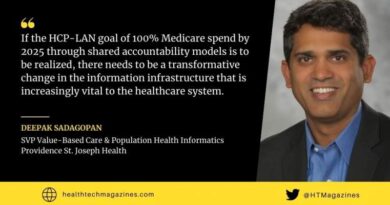Population Health Transformation: Leveraging Digital and Information Technology
By Ron Parton, MD, MPH, Chief Medical Officer, Christus Health Plans
Integrated health care systems are adopting digital and information technology, along with advanced analytics, as key ingredients in their transformation to population health. This translates to improved quality and reduced medical costs and will give them a strong competitive advantage.
Not only that, but the COVID-19 pandemic has accelerated the adoption of virtual care, and we can expect that the use of technology-based solutions will continue to grow. Virtual care, remote monitoring, smart wearables, smartphone apps, artificial intelligence, care management platforms, clinical decision support tools, digital therapeutics, shared decision-making, self-management education/training, care team workflow, and support, population surveillance, secure messaging, data exchange, and integrated databases coupled with advanced analytics all can be assembled into a comprehensive enterprise digital health strategy. Digital technology will improve access, make care more affordable, and enhance consumer experience and satisfaction. It will also dramatically improve health behaviors and self-care engagementleading to improved outcomes and well-being for our patients.
Digital technology will improve access, make care more affordable, and enhance consumer experience and satisfaction.
Population health transformation priorities:
- Patient engagement in health and well-being
- Clinical decision support for evidence-based care
- Care team workflow, connectivity, and use of telehealth
- Data-driven decision-making
Patient engagement in health and well being
One of the greatest population health improvement challenges is engaging high-risk chronically ill patients in improving their health behaviors and self-care management. Tailoring patient education, communication, and training toward patients’ health literacy, ethnicity, preferences, learning styles, and personality traits can effectively engage them in positive health behaviors and better self-care. Utilizing remote monitoring, digital assessment tools, secure messaging, surveillance of symptoms/biometrics, online education, and telehealth training for self-care management can all be integrated into a comprehensive program for health coaching and chronic illness management. When patients can easily and regularly access their care teams for information, coaching, medication adherence, therapeutic decisions, reminders/alerts, scheduling, and virtual visits, they become more engaged, improve their satisfaction/compliance, and have better health outcomes.
Clinical Decision Support for evidence-based care
Clinical Decision Support Systems (CDSS) are comprised of software tools designed to provide direct aid to clinical decision-making by matching patient-specific information to clinical knowledge bases and presenting “point of care” recommendations that aid in diagnostics, therapeutics, adherence, and clinical management. CDSS often uses web-based applications or tools embedded in electronic records and computerized provider order entry systems. They also can be administered through desktops, tablets, smartphones, remote monitoring, and care management platforms. Creating systems that promote the use of evidence-based technology therapeutics and care pathways can dramatically improve clinical effectiveness, safety, and health outcomes. The scope of functions provided by CDSS is vast, including diagnostics, safety, alarm systems, disease management, prescription drug control, shared decision-making, use of surgery/technology, etc. They can be administered using computerized alerts, reminders, guidelines, care pathways, order sets, patient reports, documentation, and workflow tools. One of the challenges is introducing CDSS in a way that increases effectiveness without creating barriers and alert fatigue or adversely effecting workload and clinical efficiency. The cost and resources required for ongoing system and content management to provide up-to-date information can be large. Transportability and interoperability across EHRs and information technology are challenging. But it is worth it; optimizing the application of evidence-based care has the opportunity to reduce costs, improve outcomes, and result in higher-value care.
Care team workflow, connectivity, and use of telehealth
Virtual care and other digital technologies have increased the opportunity to integrate and coordinate care provided by multi-disciplinary teams of health care professionals. Workflow mapping and design to facilitate the efficiency of care team models is becoming more pressing due to: new technologies/methodologies, remote monitoring and secure messaging for chronic illness, the growing number of specialized professionals on the team, complex interdepartmental care pathways, and time/resource restraints for larger systems across large geographies. Telehealth can facilitate cross-disciplinary care team conferences with and without the patient to coordinate routine care and/or discuss complex clinical issues and agree on a comprehensive care plan that optimizes resources and the use of clinical expertise. Digital and information technology, if used well, can improve the efficiency and effectiveness of care team workflow. This is why population health care management platforms that are embedded or integrated with EHRs can be transformational. Care team function must also be intentional, with careful thought to creating measurable goals, roles, accountabilities, facilitation, leadership, training, team-building, cycles of improvement, and human behavior/dynamics. Information sharing and transfer across the teams, clinicians, and organizations are complex and can only improve with intention, design, measurement, and feedback. Data capture of daily assessment/biometrics, comprehensive and daily assessments, and social determinants provides more timely information to the teams. Access to mental health professionals has been a challenge for our health care system. Still, telemedicine has created virtual access to mental health professionals in rurally located emergency departments and co-located and integrated behavioral health providers and clinical pharmacists into primary care settings and care teams.
Data-driven decision-making
Information technology and data from multiple sources, including new digital health technology, should enable a number of professionals to use advanced analytics to measure performance and share information across networks. Helping health care leaders understand the variation in cost/resource use, health outcomes, clinical quality, and care experience across multiple populations will help drive the imperative for health care redesign, use of digital health technology, and proactive care team management. Integrating information and workflows across care management teams, EHRs, providers, community resources, and Health Information Exchanges (HIEs) will improve communication, reduce inefficiencies, and promotes better knowledge and understanding. Large quantities of health care data accumulating across patients and populations coupled with new analytic approaches will provide a new generation of knowledge to address the unmet information needs of patients, clinicians, researchers, and health policymakers. New learnings from improved patient engagement, advanced clinical decision-making systems, and care team function will allow us to: improve our abilities to track and enhance longitudinal health outcomes and patient experience; measure both direct variable and total medical costs; demonstrate sustainable value.



